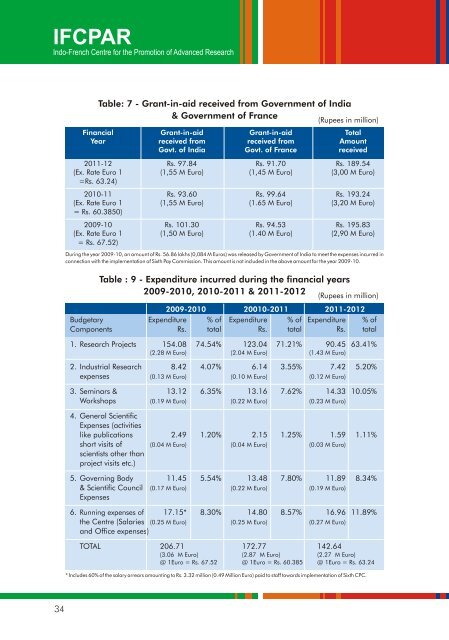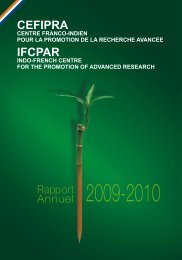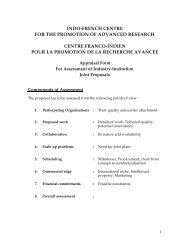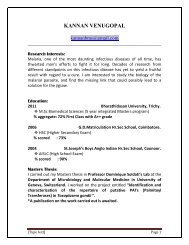IFCPAR AR (ENGLISH) for CD - CEFIPRA
IFCPAR AR (ENGLISH) for CD - CEFIPRA
IFCPAR AR (ENGLISH) for CD - CEFIPRA
You also want an ePaper? Increase the reach of your titles
YUMPU automatically turns print PDFs into web optimized ePapers that Google loves.
34<br />
Life and Health Sciences<br />
Dr. Saumitra Das<br />
Department of Microbiology and<br />
Cell Biology<br />
Indian Institute of Science<br />
Bangalore<br />
Dr. Robin Fahraeus<br />
Institut de Pharmacologie<br />
INSERM 940<br />
Paris<br />
Project 3703-1<br />
STUDIES ON THE REGULATION OF p53 mRNA TRANSLATION<br />
<strong>IFCP<strong>AR</strong></strong><br />
Indo-French Centre <strong>for</strong> the Promotion of Advanced Research<br />
Duration: Three years and nine months(August, 2007 to April,<br />
2011)<br />
Objectives<br />
The tumor suppressor protein p53 plays multiple integral<br />
functions in the cell via controlling expression of multitude of<br />
downstream genes involved in cell cycle arrest and apoptosis.<br />
Thus, the level of the protein and its iso<strong>for</strong>ms should be tightly<br />
regulated under both normal physiological as well as stress<br />
conditions. The project aims to study the regulation of p53<br />
mRNA translation at the level of initiation. The specific<br />
objectives are:<br />
i) Characterization of the internal ribosome entry sites within<br />
p53 mRNA<br />
ii) Characterization of p53 mRNA translation control by the<br />
E3 ubiqutin ligase Mdm2<br />
Accomplishments<br />
i) The Mdm2 protein binds directly to the p53 mRNA to induce<br />
p53 synthesis. This is the first report on E3 ligase binding an<br />
mRNA and controlling translation<br />
ii) The Mdm2- p53 mRNA interaction requires Mdm2 to be<br />
phosphorylated on Ser395. This site is phosphorylated by<br />
ATM and links the DNA damage response with Mdm2, p53<br />
synthesis and activation<br />
iii) The p53/47 product is induced by PERK in response to the<br />
unfolded protein response (UPR) and is required <strong>for</strong><br />
endoplasmic reticulum (ER) stress-induced G2 arrest<br />
iv) Polypyramidine tract binding protein (PTB) acts as a<br />
transacting factor <strong>for</strong> p53 mRNA translation and relative<br />
abundance of PTB in the cytoplasm differentially regulates<br />
IRES-mediated translation of the p53 iso<strong>for</strong>ms<br />
v) hnRNP C1/C2 differentially regulates synthesis of p53 and<br />
p53/47 iso<strong>for</strong>ms<br />
Research papers published: Four<br />
Papers presented in conference: 15<br />
Poster: 17





